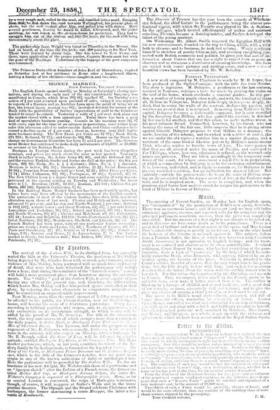311111ir.
The opening of Covent Garden, on Monday last, for English opera, was "inaugurated" by the production of Balfe's new opera, Satanella. There was an enormous house; and if incessant (and we may add indis- criminate) applause, encores, and repeated calls for the composer and the principal perfonuers constitute success, then the piece was completely successful. But the success of a first night is not always to be relied on, and in this case we have some doubt as to its permanence. There is a great deal of brilliant and melodious music in the opera, and Miss Louisa Pyne's admirable singing is greatly in its favour ; but on the other hand the badness of the libretto is as much against it. The subject, (taken from a Parisian ballet, the idea cf which was borrowed from Cimotte's 1)/able Amotereux,) is not agreeable to English feeling ; and its treat- ment is so confused and obscure as to be often unintelligible. A ruined nobleman, Count Rupert by name, who has lost everything at the gam- Mg-table, finds a book of " gramarye," by the help of which he reck- lessly raises the Devil, alias Arimanes, who appears, followed by an at- tendant sprite, the heroine of the piece. Satanclla is attached to the Count's service, in order of course, that she may tempt him to his perdi- tion ; but site falls deeply in love with him ; end such is her generous devotion that she brings about his onion with the earthly damsel who is her rival. For this virtue she is pardoned by the Almighty, and ascends to heaven. This, we suspect, is too much in the French gusto to be palatable here, even were it better cooked than it is. The outline is filled up by a farrago of childish and absurd incidents, and a great deal of low comedy, or farce, excessively Jell and tedious ; and to give the picee any (bailee of success, a third part of it, at least must he cut out.
The inusic is in Balfe's usual style—flaunt, animated, and full of
happy dramatic efficts, reminding U3 COSIStailily of Auber. Louisa thoutili somewhat too stout and substantial for an imp of darkness, :ens with siclrit and sings with a finish and brilliancy peculiar to herself. The other printipal parts are well sustained by Harrison, Miss Isaacs, ant Weiss ; and the piece, as a whole, is got up with the richness and splendour to which we have been accustomed at the Royal Italian Opera.


























 Previous page
Previous page